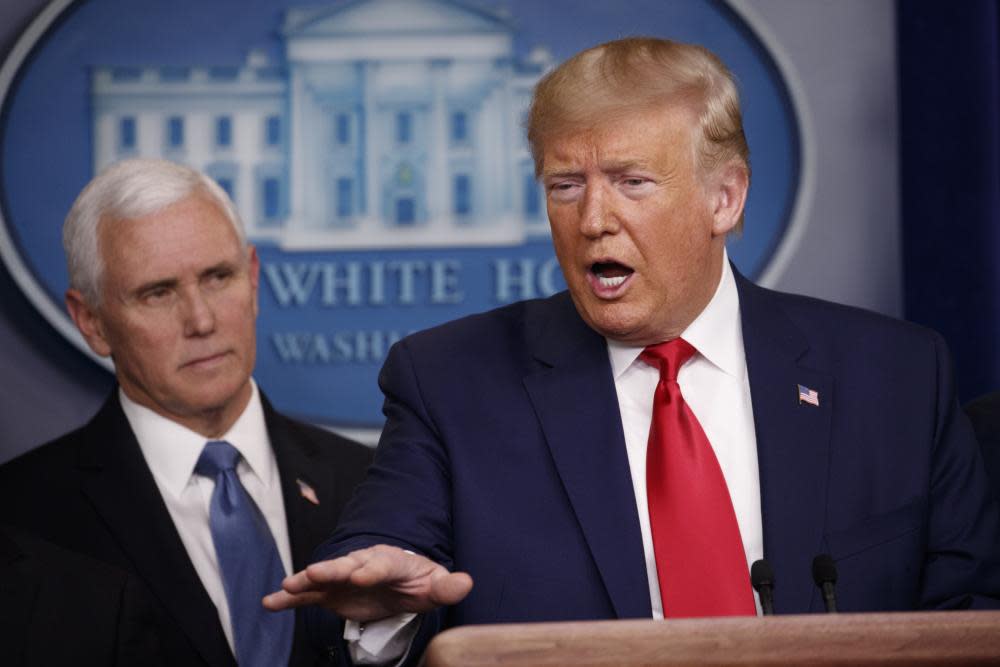Coronavirus: Trump's mixed messages 'undermines public trust', experts say

The Trump administration’s politicization of science and cuts to health institutions are raising concerns about its preparedness to handle the coronavirus outbreak.
Related: Trump fends off criticism of 'hoax' remark after first US coronavirus death
The first known death from the virus on US soil was reported in Washington state on Saturday. Sixty-six cases have been reported across the country, and thousands more globally.
But health experts say the Trump administration is still sending mixed messages about a growing public health crisis.
“It undermines public trust,” Dr Georges C Benjamin, executive director of the American Public Health Association, told the Guardian. “This isn’t well-coordinated.”
Before a White House press conference on Saturday, Donald Trump repeatedly downplayed the issue and echoed allies in the conservative media in accusing political opponents and the media of overstating the threat in order to make him look bad while markets take a hard hit, threatening the US economy.
On Saturday, the president repeatedly praised what he called “the most aggressive action in modern history to confront this disease”.
“Our country is prepared for any circumstance, we hope it’s not going to be a major circumstance,” Trump said, asking the media and politicians not to do “anything to incite panic at all”.
Trump and federal health officials also sought to reassure the public about the nature of the coronavirus, if in calmer tones than those chosen by Mick Mulvaney, the president’s acting chief of staff, at the Conservative Political Action Conference on Friday.
Suggesting the media was inflating the issue to “bring down” the president, Mulvaney said the virus was less threatening than previous public health crises, such as the Ebola crisis of 2014.
“It’s not a death sentence,” Mulvaney said.
Public health officials, however, have repeatedly warned of the seriousness of the outbreak. At the White House on Saturday, Dr Anthony Fauci of the National Institute of Allergy and Infectious Diseases detailed how most coronavirus deaths are in older people with health issues but younger people do die in outlying cases.
“Ultimately, we expect we will see community spread in this country,” Nancy Messonnier, head of immunization at the Centers for Disease Control and Prevention, said earlier this week. “It’s not so much a question of if this will happen anymore, but rather more exactly when this will happen, and how many people in this country will have severe illness.”
“This could be bad,” Messonnier added.
Experts warn that conflicting statements could complicate public health officials’ response to the crisis at federal, state and local levels.
“If you have different messengers giving different messages, that is a recipe for confusion, and could potentially undermine the effectiveness of the response,” said Dr Josh Michaud, associate director of global health policy at the Kaiser Family Foundation.
The administration’s continued dismissal of the severity of the situation has also exacerbated concerns that it has not taken the threat seriously enough – and that it is already in a weakened position because of funding and personnel cuts to health programs.
The Trump administration has repeatedly proposed significant cuts to health and science agencies, including in the 2021 budget, in which he called for a close to 10% reduction in Health and Human Services funding overall and a nearly 16% slash at the CDC.
While Congress has ignored those proposed cuts and instead increased funding to the CDC and National Institutes of Health, some initiatives aimed at battling epidemics have been cut or eliminated.
In 2018, when the White House declined to provide the agency with additional resources, the CDC downsized by 80% programs designed to prevent the spread of infectious diseases. The same year, the administration shuttered the National Security Council’s global health security unit.
Robert O’Brien, Trump’s national security adviser, has suggested such cuts were part of a “streamlining” of the NSC. But former officials have expressed concern.
“This is why you have a National Security Council,” former Pentagon speechwriter John Gans, who wrote a book about the NSC, told NBC News this week.
Experts told the Guardian public health funding issues predate the Trump administration.
“It’s a lot of peoples’ fault,” Benjamin said, adding that the current administration has “exacerbated” the matter.
“Any time something new like this happens, it’s going to be messy,” the APHA executive director said of the coronavirus. But “several of the administration’s actions have undermined our preparedness.”
Dr John Ioannidis, chair in disease prevention at Stanford University medical school, urged calm, warning against a “panic epidemic” and “extreme measures” in response to the virus.
“Both politicians and self-proclaimed experts should talk less,” Ioannidis told the Guardian in an email.
Others, however, have continued to express concern. Already the US has experienced issues with faulty test kits and a delayed diagnosis for a California woman believed to be the first instance of community spread in the country.
Critics of the administration have also raised concerns about the $2.5bn the White House requested this week from Congress, arguing that it was too small to adequately address the problem.
Concerns have also been raised about Trump’s appointment of Vice-President Mike Pence to coordinate the government response. Trump “made the choice of putting someone absolutely not up to the task to this crucial position”, Gregg Gonsalves, assistant professor of epidemiology at Yale University, tweeted after the announcement.
“They need to do a lot of work to rebuild public trust,” Benjamin said. “Hopefully, they’re learning that lesson.”

